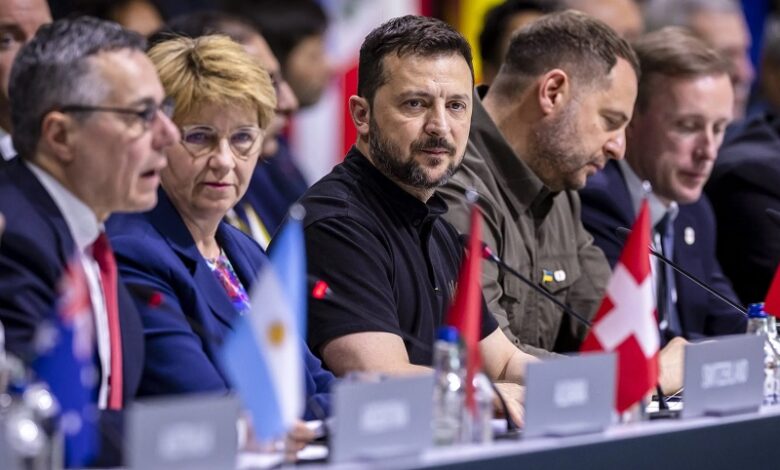Zelensky Proposes Peace Plan for Ukraine, Seeks Global Consensus

News Mania Desk/ Agnibeena Ghosh/18th June 2024
Ukrainian President Volodymyr Zelensky announced on Saturday that he intends to present Moscow with a proposal for ending the ongoing war, once it has been approved by the international community. This commitment was made in Switzerland during the inaugural peace summit for Ukraine, attended by representatives from over 90 countries, though notably not by Russia.
During his address, Zelensky expressed his hope that the summit would establish the foundation for a “just” and “lasting” resolution with Russia. He emphasized the need for a collective decision on what constitutes a just peace for the world and how it can be sustainably achieved. “Then it will be communicated to the representatives of Russia, and so that at the second peace summit, we can fix the real end of the war,” Zelensky stated.
Zelensky did not specify whether he was willing to engage in direct talks with Russian President Vladimir Putin. The day before the summit, Putin outlined his own conditions for ending the conflict, demanding that Ukraine withdraw its troops from the south and east of the country and abandon its aspirations to join NATO. Zelensky quickly dismissed these conditions. “He is not calling for negotiations; he is calling for surrender,” remarked US Vice President Kamala Harris during the summit, condemning Putin’s demands.
Western leaders at the summit affirmed their support for Ukraine and underscored the necessity of a settlement on Kyiv’s terms. German Chancellor Olaf Scholz argued that a ceasefire without serious negotiations and a clear path to lasting peace would only serve to legitimize Russia’s illegal territorial claims. European Commission President Ursula von der Leyen echoed this sentiment, warning that freezing the conflict with foreign troops occupying Ukrainian land would be a precursor to future wars of aggression.
While Western leaders stood firm, some countries outside Ukraine’s traditional allies emphasized the importance of including Russia in the dialogue and criticized certain Western sanctions. Saudi Foreign Minister Faisal bin Farhan Al-Saud highlighted the need for Ukraine to be ready for a “difficult compromise” if it truly seeks to end the conflict. Additionally, Kenyan President William Ruto criticized a recent G7 agreement to offer Ukraine a $50 billion loan secured against profits from frozen Russian assets. He described the unilateral appropriation of Russian assets as unlawful and condemned Russia’s invasion as a “horrifying spectacle of carnage and devastation.”
The peace summit marked a significant step in Zelensky’s efforts to garner international support for a resolution to the conflict. His strategy involves building a global consensus on the terms of peace, which would then be presented to Russia. This approach aims to ensure that any peace agreement has widespread backing and is not solely dictated by the immediate parties involved.
Zelensky’s proposal highlights the complexity of achieving peace in Ukraine. The insistence on a just and lasting settlement reflects a desire not only to end the current conflict but also to prevent future aggression. However, the divergent views expressed at the summit underscore the challenges ahead. While Western nations remain staunchly supportive of Ukraine’s sovereignty and territorial integrity, other countries call for a more inclusive approach that considers Russia’s perspective.
The ongoing war in Ukraine has had devastating impacts, causing widespread destruction and loss of life. The peace summit represents a critical effort to address these issues and find a path forward. Zelensky’s vision of a globally endorsed peace plan offers a potential route to ending the conflict, but it also requires navigating a complex web of international relations and differing interests.
In conclusion, President Zelensky’s commitment to presenting a peace proposal to Moscow, once approved by the international community, signifies a strategic move towards resolving the war in Ukraine. The summit in Switzerland served as a platform for rallying global support and outlining the principles of a just and lasting peace. However, the varied reactions from different countries indicate that achieving consensus will be a formidable challenge. The success of Zelensky’s peace initiative will depend on the ability to reconcile these differences and secure a broadly supported resolution






